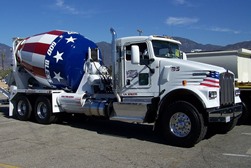How to Find the Best Truck Driver Classes near Birmingham Alabama
 Congratulations on your decision to become a truck driver and enroll in a trucking school near Birmingham AL. Perhaps it has always been your ambition to hit the open highway while driving a huge tractor trailer. Or perhaps you have done some research and have discovered that an occupation as a truck driver offers excellent wages and flexible work opportunities. No matter what your reason is, it's important to get the proper training by choosing the right CDL school in your area. When reviewing your options, there are a number of variables that you'll need to consider before making your final choice. Location will undoubtedly be important, particularly if you have to commute from your Birmingham home. The expense will also be of importance, but selecting a school based exclusively on price is not the optimal method to ensure you'll obtain the proper education. Just remember, your goal is to learn the skills and knowledge that will allow you to pass the CDL exams and become a professional truck driver. So keeping that target in mind, just how do you select a truck driving school? The answer to that question is what we are going to discuss in the rest of this article. But first, we are going to review a little bit about which CDL license you will eventually need.
Congratulations on your decision to become a truck driver and enroll in a trucking school near Birmingham AL. Perhaps it has always been your ambition to hit the open highway while driving a huge tractor trailer. Or perhaps you have done some research and have discovered that an occupation as a truck driver offers excellent wages and flexible work opportunities. No matter what your reason is, it's important to get the proper training by choosing the right CDL school in your area. When reviewing your options, there are a number of variables that you'll need to consider before making your final choice. Location will undoubtedly be important, particularly if you have to commute from your Birmingham home. The expense will also be of importance, but selecting a school based exclusively on price is not the optimal method to ensure you'll obtain the proper education. Just remember, your goal is to learn the skills and knowledge that will allow you to pass the CDL exams and become a professional truck driver. So keeping that target in mind, just how do you select a truck driving school? The answer to that question is what we are going to discuss in the rest of this article. But first, we are going to review a little bit about which CDL license you will eventually need.
Which CDL Is Required?

To drive commercial vehicles lawfully within the USA and Birmingham AL, a driver needs to attain a CDL (Commercial Driver's License). The 3 classes of licenses that a person can qualify for are Class A, Class B and Class C. Given that the subject of this article is how to select a truck driver school, we will highlight Class A and B licenses. What distinguishes each class of CDL is the kind of vehicle that the driver can operate together with the GVWR (Gross Vehicle Weight Rating) or GCWR (Gross Combination Weight Rating). Following are short descriptions for the 2 classes.
Class A CDL. A Class A CDL is needed to drive any vehicle that has a GCWR of more than 26,000 lbs., including a towed vehicle of greater than 10,000 lbs. Some of the vehicles that drivers may be able to operate with Class A licenses are:
- Interstate or Intrastate Tractor Trailers
- Trucks with Double or Triple Trailers
- Tanker Trucks
- Livestock Carriers
- Class B and Class C Vehicles
Class B CDL. A Class B Commercial Drivers License is needed to drive single vehicles having a GVWR of more than 26,000 lbs., or a GCWR of greater than 26,000 lbs. including a towed vehicle weighing up to 10,000 lbs. Some of the vehicles that operators may be qualified to drive with Class B licenses are:
- Tractor Trailers
- Dump Trucks
- Cement Mixers
- Large Buses
- Class C Vehicles
Both Class A and Class B CDLs might also require endorsements to drive specific kinds of vehicles, for example passenger or school buses. And a Class A license holder, with the appropriate required endorsements, may drive any vehicle that a Class B license holder is qualified to drive.
How to Evaluate a Trucker School

When you have decided which CDL you wish to pursue, you can start the process of researching the Birmingham AL truck driver schools that you are considering. As already mentioned, cost and location will certainly be your primary considerations. But it can't be stressed enough that they must not be your sole considerations. Other issues, such as the experience of the instructors or the reputations of the schools are similarly or even more important. So below are some more things that you need to research while carrying out your due diligence before enrolling in, and especially paying for, your truck driver training.
Are the Schools Accredited or Certified ? Very few trucking schools in the Birmingham AL area are accredited because of the rigorous process and expense to the schools. However, certification is more prevalent and is provided by the Professional Truck Driver Institute (PTDI). A school is not obligated to become certified, but there are a number of advantages. Prospective students recognize that the training will be of the highest caliber, and that they will get plenty of driving time. For example, PTDI calls for 44 hours of actual driving time, not simulations or ride-alongs. So if a school's course is certified (the course, not the school is certified), students know that the curriculum and training will comply with the very high benchmarks set by PTDI.
How Long in Operation? One indicator to help measure the quality of a truck driver school is how long it has been in operation. A poorly rated or a fly by night school typically will not be in business very long, so longevity is a plus. Having said that, even the best of Birmingham AL schools had to begin from their opening day of training, so use it as one of multiple qualifiers. You can also ask what the school's track record is pertaining to successful licensing and employment of its graduating students. If a school won't provide those numbers, look elsewhere. The schools should also maintain associations with regional and national trucking firms. Having numerous contacts not only points to an excellent reputation within the profession, but also boosts their job placement program for students. It also wouldn't hurt to check with the Alabama licensing authority to confirm that the CDL trucking schools you are reviewing are in compliance.
How Good is the Training? At a minimum, the schools should be licensed in Alabama and hire instructors that are experienced and trained. We will talk more about the instructors in the next section. Also, the student to instructor ratio should be no greater than 4 to 1. If it's any greater, then students will not be obtaining the personal attention they will need. This is especially true regarding the one-on-one instruction for behind the wheel training. And be critical of any school that insists it can train you to drive trucks in a comparatively short time period. Training to be a truck driver and to drive a tractor trailer professionally requires time. Most Birmingham AL schools provide training courses that run from 3 weeks to as long as two months, based on the class of license or kind of vehicle.
How Good are the Trainers? As previously stated, it's important that the instructors are qualified to teach driving techniques and experienced as both drivers and instructors. Even though several states have minimum driving time requirements to qualify as an instructor, the more professional driving experience an instructor has the better. It's also important that the instructors stay current with industry advancements or any new regulations or changes in existing laws. Assessing instructors may be a bit more intuitive than other standards, and perhaps the best approach is to check out the school and talk to the instructors in person. You can also speak with a few of the students completing the training and find out if they are satisfied with the quality of instruction and the teacher's ability to train them.
Sufficient Driving Time? Most importantly, a great trucking school will furnish plenty of driving time to its students. Besides, isn't that what it's all about? Driving time is the actual time spent behind the wheel driving a truck. While the use of simulators and ride-a-longs with other students are necessary training methods, they are no replacement for actual driving. The more training that a student receives behind the wheel, the better driver he or she will be. Although driving time fluctuates between schools, a good benchmark is 32 hours at a minimum. If the school is PTDI certified, it will furnish no less than 44 hours of driving time. Get in touch with the Birmingham AL schools you are considering and ask how much driving time they provide.
Are they Captive or Independent ? You can receive discounted or even free training from certain trucking schools if you make a commitment to drive for a particular carrier for a defined time period. This is what's known as contract training, and the schools that provide it are called captives. So rather than having associations with many different trucking lines that they can place their graduates with, captives only refer to one company. The tradeoff is receiving less expensive or even free training by surrendering the freedom to initially be a driver wherever you have an opportunity. Clearly contract training has the potential to restrict your income opportunities when beginning your new career. But for some it may be the ideal way to obtain affordable training. Just be sure to ask if the Birmingham AL schools you are looking at are captive or independent so that you can make an informed decision.
Is there Onsite CDL Testing? There are a number of states that will allow 3rd party CDL testing onsite of truck driving schools for its grads. If onsite testing is allowed in Alabama, ask if the schools you are looking at are DMV certified to provide it. One advantage is that it is more accommodating than competing with graduates from competing schools for test times at Alabama testing facilities. It is moreover an indicator that the DMV considers the authorized schools to be of a higher quality.
Are the Class Times Flexible? As formerly noted, CDL training is only about 1 to 2 months long. With such a brief duration, it's important that the Birmingham AL school you enroll in offers flexibility for both the curriculum and the scheduling of classes. As an example, if you're having a hard time learning a certain driving maneuver, then the instructor should be willing to dedicate more time with you until you have it mastered. And if you're still working while going to training, then the class scheduling needs to be flexible enough to fit in working hours or other commitments.
Is Job Placement Provided? Once you have received your commercial driver's license after graduating from trucking school, you will be impatient to begin your new career. Confirm that the schools you are looking at have job assistance programs. Find out what their job placement percentage is and what average salary their graduates start at. Also, ask which national and local trucking companies their graduates are referred to for hiring. If a school has a poor job placement rate or few Birmingham AL employers hiring their graduates, it might be a sign to look elsewhere.
Is Financial Assistance Provided? Truck driving schools are comparable to colleges and other Birmingham AL area technical or vocational schools when it comes to loans and other forms of financial assistance being offered. Find out if the schools you are examining have a financial assistance department, or at least someone who can help you understand the options and forms that must be completed.
Learn More About Birmingham CDL Training Schools
Select the Best Birmingham AL CDL Driver Training
Picking the appropriate truck driver school is a critical first step to beginning your new profession as a local or long distance truck driver. The skills taught at school will be those that forge a new career behind the wheel. There are several options offered and understanding them is vital to a new driver's success. But first and foremost, you must get the proper training in order to drive a big commercial vehicle in a professional and safe fashion. If you are lacking cash or financing, you might want to look into a captive school. You will pay a lower or in some cases no tuition in exchange for driving for their contracted carrier. Or you can choose an independent truck driving school and have the the freedom to drive for the trucking company of your choosing, or one of several associated with the school. It's your decision. But no matter how you receive your training, you will in the near future be part of an industry that helps America move as a professional truck driver in Birmingham AL.
